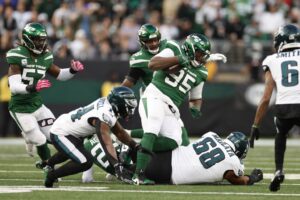Maryland Governor Proposes Raising Tax Rate on Sportsbooks’ Revenues
-
Bookmakers Review
- January 17, 2025

Maryland Governor Wes Moore has proposed hiking the tax rate that mobile sportsbooks pay on their adjusted gross revenues, which will likely cause a backlash from the industry.
The Tax Man Cometh
Raising tax rates on mobile sportsbooks has become part of the budget playbook for states seeking additional revenue to address financial shortfalls. Ohio doubled its rate from 10% to 20%, while Illinois shifted from a flat 15% tax to a tiered structure that will levy as much as a 40% tax on the most prolific revenue-producing sportsbooks.
Maryland is the latest to propose a tax increase that would see the state’s mobile sportsbooks double their contributions from 15% to 30% if the budget is approved. The move comes on the heels of a projected $3 billion deficit, and the governor is exploring ways to reduce or eliminate it.
Also included in Governor Moore’s proposal is raising the state income tax rate to 6.25% on residents earning more than $500,000 and imposing a 6.5% rate on those making more than $1 million. He has also taken aim at the state’s land-based casinos, suggesting an increase from 20% to 25% on table games’ revenues.
Gaming the System
Louisiana and Michigan have also expressed interest in raising tax rates during this new legislative session, which prompted Truist analysts to comment, “The greater risk, of course, is more states follow suit and explore higher gaming taxes.”
With new taxes comes a likely reprisal from the gaming industry, and the effects will be felt in falling stock market prices for those mobile gaming companies operating in those states. The consumer will also likely be affected as the companies will pursue strategies to reduce costs, which could manifest in less favorable odds, fewer bonuses and less frequent promotions.
Lastly, if fewer people are enticed to bet, the overall revenues could fall, which would adversely affect both the sportsbooks’ revenues and, by default, a possible decrease in tax revenue. The states are banking on the fact that doubling the rate will outweigh the effects of the sportsbooks’ reduced revenue.
iGaming Legislation
As more and more states become accustomed to the revenue stream generated by the mobile sports betting industry, the more lucrative iGaming industry has become more widely discussed. States have been reluctant to embrace online casino gambling due to a fear of increased addiction and the deleterious effects it may have on land-based casinos’ revenues, whose operators cite cannibalization and job losses.
Last year, DraftKings CEO Jason Robins floated the idea of a tax on winning bets in the New York market to offset its national high tax rate of 51%. Robins said at the time, “In the end, the cost has to get absorbed by the consumer if the government raises taxes. So, there’s various levers to that. Also, we could lower external marketing, which I think will be partially just driven by the fact that if taxes go up, we’re going to have to create better margins.”
However, when rival FanDuel announced it would not be following suit, DraftKings abruptly abandoned the idea. However, some believe Maryland’s desire to raise money could pave the way for iGaming in the Old Line State.
Truist analysts stated, “Ultimately, we think: 1) this may be a step on the road to iGaming legalization (bullish for stocks), and 2) market leaders DraftKings and FanDuel are likely best positioned to weather any storm as potential market share consolidators.”







